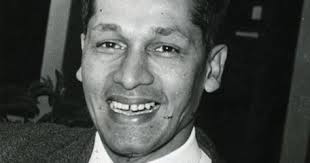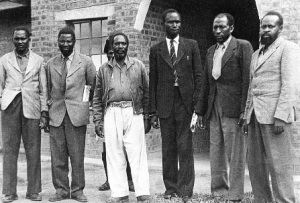
Pio Gama Pinto
‘I first met Pinto in Kisumu in 1961. ‘I was then 16 years old. Our meeting happened under very unique circumstances. Pinto had been released earlier from detention. My father Achieng’ Oneko had been moved from Marsabit to Kapsabet where he was under house arrest. I do not know how Pinto learnt of my father’s placement under house arrest but he drove all the way from Nairobi to our home in Kisumu.
From Kisumu, we drove to Kapsabet. On the way, he promised he would have me transferred to Kapsabet High School. He would also avail all the books that I needed. He kept his word. When we got to Kapsabet, he parked the car two kilometres to the location where my father was placed under house arrest.

Pio Gama Pinto at the unveiling of Jomo Kenyatta’s statue in December 1964 at the Lumumba Institute in Nairobi.
He tucked a parcel in my pocket and instructed me not to touch it. Then he asked me to pass by a tailoring shop owned by his friend Okuto Bala and inform him a certain person would be visiting.
I did this and proceeded to my father’s restriction place. When I got to the restriction house, my father went straight to my pocket, pulled the parcel and retreated into another room to check its contents.
It was only after doing so that he talked to me. Later, after my father was released and moved to his home in Uyoma, that I learnt that the person whom Pinto had asked me to inform Bala was coming was actually my father. Pinto had arranged to meet my father in one of the rooms behind the tailors shop.
At the meeting, he briefed him about the parcel he was sending with me (money and letters from other freedom fighters).
The reason he sent the parcel with me was because my father was not allowed to meet people without permission from colonial government; not least Pinto who was constantly trailed by the Special Branch.
I did not meet him again until 1964 when I returned from university studies in Russia. When I returned to Kenya, I went to see my father who had been appointed by President Jomo Kenyatta as Minister for Information and Broadcasting. In the intervening period, my father had employed Pinto’s wife as his private secretary. Pinto had also learnt that I was back from studies and came to see me in the office.
Later that evening, he drove me around Nairobi to help me get acquainted with the city that had radically changed from the time I left. This evening drive was to become a ritual and I remember him coming everyday to pick me from home at six in the evening.

The Kapenguria Six comprising: Bildad Kaggia, Kung’u Karumba, Jomo Kenyatta, Fred Kubai, Paul Ngei, and Achieng’ Oneko. They were arrested in 1952 and detained in Kapenguria.
In a booklet published in 1966 for his first anniversary but never circulated, Jaramogi Oginga Odinga points out that it was Pinto who organised lawyers to defend the freedom fighters when they arrested by the colonial government.
During the struggle for freedom from the British, Pinto maintained political liaison and supplied arms and money to the fighters from supply lines in Nairobi.
When the men in the forests required support, he sent money and arms secretly. He knew the consequences if he was caught— detention, even death—but nothing could stop him. When the (colonial) authorities caught up with his activities, he served his term of detention.
When he was assassinated, it became apparent that Pio Gama Pinto had spent all his money in the fight against the colonial government and its remnants in the new independent Kenya government. His wife and three daughters would have remained destitute were it not for his socialist friends who opened a trust fund to help the family.
In a strange twist of irony, the government made of former freedom fighters which he fought so hard to put in power, would not contribute a single cent to the trust fund.
Additional information from www.awaazmagazine.com
in News Analysis February 26, 2015
Dr Ongong’a Achieng’, an economics lecturer at the Technical University of Kenya and son of freedom fighter Achieng’ Oneko, carries the testimony of Pio Gama Pinto’s concerns for families of liberators. He tells Gitahi Ngunyi of his relationship with Pinto.
http://mediamaxnetwork.co.ke/peopledaily/137836/pinto-played-big-brother-freedom-heroes-families/
![]()

